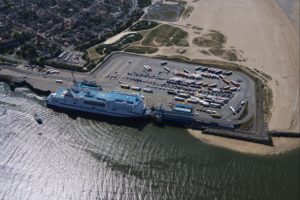Brittany Ferries prepares for a ‘no-deal’ Brexit
Ferry company Brittany Ferries has embarked on a rigorous series of ‘dry runs’ to prepare for the possible consequences of a no-deal Brexit on both sides of the Channel. The first rehearsal took place on Wednesday 11th September as lorries in Portsmouth embarked the overnight sailing to Caen, and continued the following morning as vehicles disembarked in France in the presence of Gérard Darmanin, the French Minister of Public Action and Accounts.

Altogether 15 rehearsals are planned between now and mid-October. These will take place in eight Brittany Ferries ports: Portsmouth, Poole, and Plymouth in the UK, and Le Havre, Caen, Cherbourg, St Malo and Roscoff in France. Five Brittany Ferries ships are also involved: Mont St Michel, Armorique, Étretat, Barfleur, and Bretagne.
This week’s trial involved around 100 freight vehicles travelling from the UK to France carrying a wide variety of loads including furniture, perfumes, aircraft wings and engines, car parts, fish, tractors, bird food, steel, and salt. The Portsmouth to Caen route is the busiest Channel crossing west of Dover carrying one million passengers, 280,000 cars and 100,000 heavy good vehicles each year.
Patrice Narozny, director of port operations France said: “Over the last 12 months Brittany Ferries has been actively preparing to deal with a no-deal Brexit. We’ve adapted our IT systems, allowing seamless communication with customs offices ashore. We’ve also implemented a system allowing us to communicate vital information to lorry drivers via text message and onboard live information screens.
“These dress rehearsals will allow us to test these new tools and procedures, and also the co-ordination between all the different players. Our freight customers, holidaymakers travelling with pets, customs offices, port authorities, and our own operations departments all need to be perfectly co-ordinated to ensure smooth and efficient loading and unloading in our ports.
“So we need to test every part of the process to make sure everything works efficiently and harmoniously. Once this programme is completed and we’ve made any necessary tweaks, we’ll be ready to welcome our passengers whatever happens post-Brexit.”
As part of the dry runs, information about freight vehicles boarding Brittany Ferries’ vessels in the UK are sent electronically to French customs officers, who divide vehicles into a green channel for those with advance clearance, and orange for those requiring inspection upon arrival in France. Drivers are informed of their vehicle’s status by onboard information screens. On arrival in France, lorries in the green channel can bypass customs controls as they exit the port. Meanwhile those designated ‘orange’ must proceed to a dedicated customs facility for inspection and paperwork checks.
-Ends-
About Brittany Ferries
In 1967 a farmer from Finistère in Brittany, Alexis Gourvennec, succeeded in bringing together a variety of organisations from the region to embark on an ambitious project: the aim was to open up the region, to improve its infrastructure and to enrich its people by turning to traditional partners such as Ireland and the UK.
In 1972 BAI (Brittany-England-Ireland) was born. The first cross-Channel link was inaugurated in January 1973, when a converted Israeli tank-carrier called Kerisnel left the port of Roscoff for Plymouth carrying trucks loaded with Breton vegetables such as cauliflowers and artichokes. The story therefore begins on 2 January 1973, 24 hours after Great Britain’s entry into the Common Market (EEC). From these humble beginnings however Brittany Ferries as the company was re-named quickly opened up to passenger transport, then became a tour operator.
Today, Brittany Ferries has established itself as the national leader in French maritime transport: an atypical leader, under private ownership, still owned by a Breton agricultural cooperative. Eighty five percent of the company’s passengers are British. Around 210,000 freight units are carried each year.
- Turnover: Approximately €444.2m per year
- Employment – Between 2400 and 3100 employees (including 1,700 seafarers), depending on the season. 360 in the UK.
- Passengers: Between 2.5 and 2.7 million each year travelling in approximately 900,000 cars
- Freight: 205,400 units transported annually, and one freight-only route linking Bilbao and Poole
- Twelve ships operating services that connect France, the United Kingdom, Ireland and Spain
- Eleven ports in total: Bilbao, Santander, Portsmouth, Poole, Plymouth, Cork, Caen, Cherbourg, Le Havre, Saint-Malo, Roscoff
- Tourism in Europe: There were 854,000 unique visitors, staying 9.2 million bed-nights in France.
www.brittanyferriesnewsroom.com.
Contact:
- Ellis Malcolm on 02392 892 221 or 07464 980 594 or [email protected]
- Christopher Jones on 02392 152 291 or 07917 540 878 or [email protected]
- Nigel Wonnacott on 02392 152 273 or 07833 446 729 [email protected]
 News
News